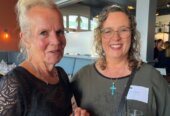
Mental health campaigner Mike King, pictured with daughter Charlie, was in Cambridge in April as part of his I Am Hope tour of the country’s intermediate and middle schools. He says society needs to change its attitude about mental health and how we talk about it.
In the wake of the death of journalist Greg Boyed recently, figures released by the chief coroner have revealed that 668 people were reported to have died by suicide in the past year.
This figure is the highest since provisional statistics were first recorded ten years ago. Since those provisional figures have been collected, New Zealand has officially lost 6,204 people to suicide. And men make up the clear majority of that number, with 4,566 men taking their own lives in the past decade, compared with 1,638 women. It’s an alarming figure, and much higher than the more publicised road toll, which showed that in 2017 there were 380 deaths on our country’s roads.
Local counsellor Sandy Wesford said that modern life is placing enormous pressure on people, particularly high achievers. “Life is getting messy and people are experiencing emotional overwhelm and powerlessness,” she said, adding that “the ‘harden up’ discourse is not helping.”
“There’s a conflict of message, where on one hand we are telling people to talk about it, with initiatives such as support groups for farmers and John Kirwan’s work, but on the other hand we’re telling them to ‘take a concrete pill’ and get over it.”
People need to remember that feelings of utter despair and believing that the world would be better off without them will not last forever: “It is just a moment in time and it will pass,” Sandy said.
Talking with a counsellor can help people to gain perspective on their issues and identify potential ‘blindspots’ in their thinking, she added.
“People can feel that there aren’t any options…going to talk to an objective person who isn’t going to judge you for feeling what you’re feeling can really help.”
As part of her work with Lifeskills, Sandy spoke with comedian turned mental health campaigner Mike King after his I am Hope tour, which visited Cambridge Middle School in April. As a result of his presentation, a couple of kids asked for help and were referred to Lifeskills for free counselling. Sandy said she and Mike “chewed the fat” for a good 40 minutes, discussing the inner critic we all have. In some cases, this internal critic can turn into a bully, leading to a state of anxiety and torment, leading people to genuinely believe that the world really would be better off without them.
“The way forward is about more understanding about how to manage emotions…understanding when you feel them and understanding how to cope with them. Talking to someone can give you these skills going forward,” Sandy concluded. “Just remember it will pass.”








